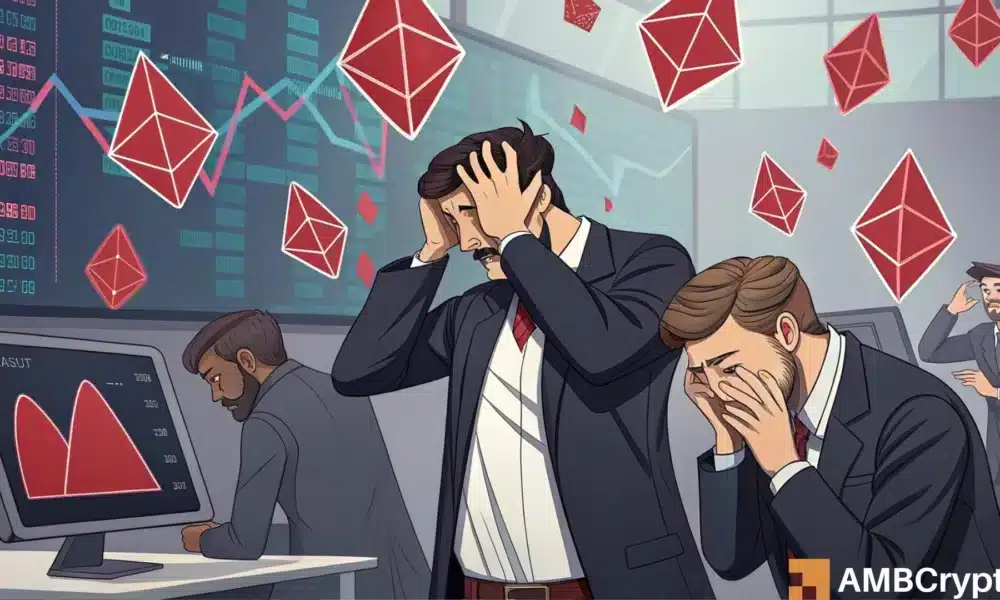Ethereum (ETH) is currently in a phase of consolidation, trading between the key supply zones of $1,540 and $1,630. Within this range, over 7.9 million ETH is held by addresses, setting the stage for a high-stakes battle between bulls and bears.
The lack of volatility in the past 24 hours suggests that a breakout in either direction could determine the next trend for ETH. The IOMAP chart shows strong support between $1,513 and $1,585, with resistance building between $1,585 and $1,630. These clusters indicate where market participants are positioned, creating significant zones that ETH needs to overcome for a meaningful move.
Technically, ETH is trading within a descending channel dating back to January 2025. The current price action is hovering around the midline of the channel, showing indecision from both buyers and sellers. A break above $1,630 could signal a bullish trend, while a failure to hold $1,540 might lead to a sharp correction towards $1,475.
Whale activity in the past week has seen a slight increase in accumulation, but a significant decline in the 30-day netflows, indicating heavy distribution. The rise in the estimated leverage ratio suggests growing speculative interest, potentially leading to a volatility spike if ETH breaks out of its current range.
On the other hand, the burn rate of ETH fees has dropped significantly, weakening the network’s deflationary support. The 7-day average burn rate is below the 90-day average, reflecting lower network activity and demand. Without a surge in on-chain activity, bullish momentum may struggle to sustain on the charts.
ETH is at a critical juncture, with various factors indicating a major move on the horizon. Bulls must act swiftly to avoid further downside, with a breakout above $1,630 potentially unlocking targets at $1,860 and beyond. However, a failure to hold $1,540 could result in a sharp correction towards $1,475.
In conclusion, ETH’s price action, on-chain clusters, and whale activity all point towards a potential major move. Traders should closely monitor key levels and market dynamics to navigate the upcoming volatility in the Ethereum market. The Impact of Social Media on Society
Social media has become an integral part of our daily lives, with billions of people around the world using platforms like Facebook, Instagram, Twitter, and TikTok to stay connected with friends and family, share personal updates, and engage with content from around the world. While social media has undoubtedly revolutionized the way we communicate and interact with one another, it has also had a significant impact on society as a whole.
One of the most notable effects of social media on society is the way it has changed the way we consume news and information. With the rise of social media, traditional news outlets have seen a decline in readership and viewership, as more and more people turn to social media platforms for their news updates. This has led to concerns about the spread of misinformation and fake news, as social media users are often exposed to unverified or biased information that can shape their perceptions of current events.
Social media has also had a profound impact on the way we communicate and interact with one another. While social media has made it easier than ever to stay connected with friends and family, it has also been linked to feelings of loneliness and isolation. Studies have shown that excessive use of social media can lead to feelings of inadequacy and low self-esteem, as users compare their lives to the curated and often unrealistic portrayals of others on social media.
Another major impact of social media on society is its role in shaping public opinion and influencing political discourse. Social media has become a powerful tool for political campaigns and movements, allowing politicians and activists to reach a wider audience and mobilize supporters. However, social media has also been criticized for promoting echo chambers and filter bubbles, where users are only exposed to information that aligns with their existing beliefs and opinions.
In addition to its social and political impacts, social media has also had a significant economic impact on society. The rise of social media influencers and online advertising has created new opportunities for businesses to reach consumers and promote their products and services. However, the monetization of social media has also raised concerns about data privacy and the exploitation of user data for targeted advertising.
Overall, the impact of social media on society is complex and multifaceted. While social media has the potential to connect people from around the world and facilitate communication and collaboration, it also has the power to shape our perceptions, influence our behavior, and impact our well-being. As we continue to navigate the ever-changing landscape of social media, it is important to be mindful of its effects and strive to use it in a way that promotes positivity, authenticity, and meaningful connections.

